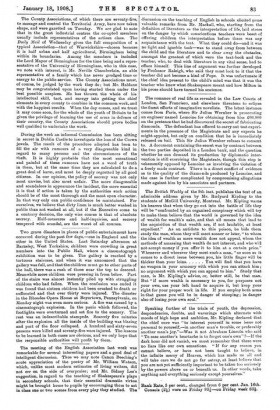The meeting of the English Association last week was remarkable
for several interesting papers and a good deal of intelligent discussion. Thus we may note Canon Beeching's acute appreciation of the poetry of Mr. William Watson, which, unlike most modern estimates of living writers, did not err on the side of overpraise; and Mr. Sidney Lee's suggestion, in regard to the teaching of Shakespeare's plays in secondary schools, that their essential dramatics virtue might be brought home to pupils by encouraging them to act in class one or two scenes from every play they atudied. The
discussion on the teaching of English in schools, elicited tome valuable remarks from Mr. Macke% who, starting from the definition of literature as the interpretation of life, laid stress on the danger by which conscientious teaohers were beset of offering children the interpretation before there was any acquaintance with the text. What they could do—and it was no light and ignoble task—was to stand away from between the child and the literature and to clear away the obstacles, amongst the greatest of which were the text-book and the teacher, who, to deal with literature in any vital sense, had to efface himself. This line of argument was further developed by Professor Raleigh, who said they must look to it that the teacher did not become a kind of Pope. It was unfortunate if the chief idea present to the child's mind was that it was the teacher who knew what Shakespeare meant and how Milton in his prose should have turned his sentence.






































 Previous page
Previous page